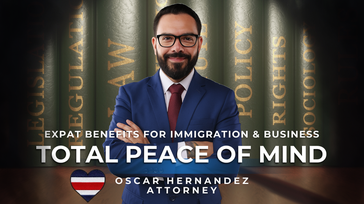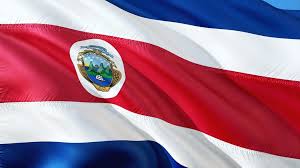The Legal Side of Costa Rica
Featuring Articles Written by Oscar Hernandez, Attorney
Oscar Hernandez is an Immigration Attorney
Located in San Jose, Costa Rica. He & His Team at
Expat Legal Advisors understand the needs
of the Expat who has begun a NEW LIFE in Costa Rica.
They know that the best way to enjoy the Pura Vida Lifestyle is to
have complete knowledge of the Laws of the Land. .
Understanding the Law & Living the Dream. .
Living the Pura Vida lifestyle in Costa Rica means more than enjoying its beaches, jungles and peaceful rhythm.
It means embracing a new way of life built on respect, knowledge and connection.
At Expat Legal Advisors, we believe that the more you understand the laws of the land,
the more fully and confidently you can enjoy the beauty of your new home.
These insightful articles, written by Attorney Oscar Hernández, who practices law in San José,
are designed to guide you through the legal landscape of Costa Rica with clarity and purpose.
From legal residency & real estate to healthcare & daily living, Oscar’s experience and dedication help demystify complex legal topics, empowering expats to make informed decisions
and live freely within the framework of Costa Rican law.
Knowledge is Peace of Mind. . and Peace of Mind is Pura Vida. .
Here, you’ll find practical wisdom, trusted guidance and the tools to help you thrive
as a well-informed member of Costa Rica’s expat community.
Enjoy this Article
Written Especially
for You. .
Consequences of the Expiration of the Benefits
Contemplated in Law No. 9996
One of the most effective ways to attract foreign investment to a country is through the creation of persuasive tax incentives that encourage individuals to invest their capital within that jurisdiction. This becomes even more significant when the decision also involves relocating one’s family residence to another country. In such cases, the fiscal and immigration conditions—along with other internal and external factors—must be favorable enough to motivate a person to emigrate. Such was precisely the case of Costa Rica when, on July 14, 2021, the Ley para la Atracción de Inversionistas, Rentistas y Pensionados (Law No. 9996) was enacted. The purpose of this legislation, as stated in Article 1, is to serve as an instrument for the country’s economic reactivation in light of the consequences of the COVID-19 pandemic. As a result, the benefits outlined in the law have encouraged many individuals seeking to relocate abroad to choose Costa Rica as their preferred destination.
Among the main incentives established by Law No. 9996 are:
1. Full exemption from import duties and tariffs, on a one-time basis, for the importation of household goods belonging to the beneficiary and their dependents.
2. Tax-free importation of up to two vehicles for personal or family use.
3. Income tax exemption for amounts declared as income to qualify for the benefits of the law.
4. A 20% exemption from the real estate transfer tax applicable to properties acquired during the law’s validity period, provided that the beneficiary is the registered owner.
5. Exemption from import taxes on instruments or materials necessary for the professional or scientific practice of the beneficiary and their dependents.
However, it is essential to note that, under Article 12 of the law, these benefits are of limited duration—and that term is about to expire. The provision stipulates that such benefits may only be granted to those who apply under the corresponding category (Investor, Rentier, or Retiree) within five years following the law’s entry into force. Therefore, individuals seeking to access these fiscal incentives after July 15, 2026, will no longer be eligible. It is thus timely to analyze some of the main legal consequences arising from the expiration of this term.
The first relevant aspect concerns the minimum investment amount required to qualify for residency under the Investor category. Article 8 of Law No. 9996 temporarily reduced that amount to USD 150,000, which could be satisfied through the acquisition of real estate, registrable assets, shares, securities, productive projects, or projects of national interest. Moreover, the law broadened the definition of “investment” to include venture capital funds and sustainable tourism infrastructure projects.
Once the term of validity of the law’s benefits expires, this financial threshold could revert to the previous minimum of USD 200,000, as established in Article 87 of Executive Decree No. 37112-GOB, published in La Gaceta No. 170 on September 1, 2009. Nonetheless, it is also possible that the Executive Branch may adjust this amount, since it falls within its discretionary authority. Furthermore, the inclusion of investments in venture capital funds or sustainable tourism infrastructure projects would cease to be an eligible option, as that prerogative was exclusive to the period covered by Law No. 9996.
Likewise, once the benefits’ validity period expires, it would still be possible to obtain residency by demonstrating the minimum investment amount determined by the Executive Branch. However, applicants would no longer be entitled to the tax incentives established by Law No. 9996. In tax matters, the creation of taxes—as well as the establishment of exemptions, benefits, and penalties—must derive exclusively from a law. Therefore, it would be legally impermissible for the Administration to extend, modify, or repeal fiscal provisions on its own.
Finally, it is important to clarify that all individuals who submit their residency application within the term of validity of the benefits—up to July 14, 2026—shall retain the right to claim recognition of such exemptions, even if, by the time the resolution granting their immigration status is issued, the term has already expired. This interpretation follows directly from Article 12 of Law No. 9996, which distinguishes between those who “opt for the benefits during the first five years of validity” and those who, having obtained them, retain them for a ten-year period from the date on which the right was granted. Accordingly, eligibility for the benefits is determined by the date on which the right to opt is exercised, not the date on which the Administration concludes the proceeding.
Lic. Oscar Andrés López Hernández
Attorney-at-Law
Expat Legal Advisors
When You're in Need of Legal Advice in Costa Rica,
contact
Oscar Hernandez at
WhatsApp:
506-8543-7650
Email:
legal@expatlegaladvisors.com
Website:
Click on the Image Above
to Visit Our Website
Read More Legal Articles Here





